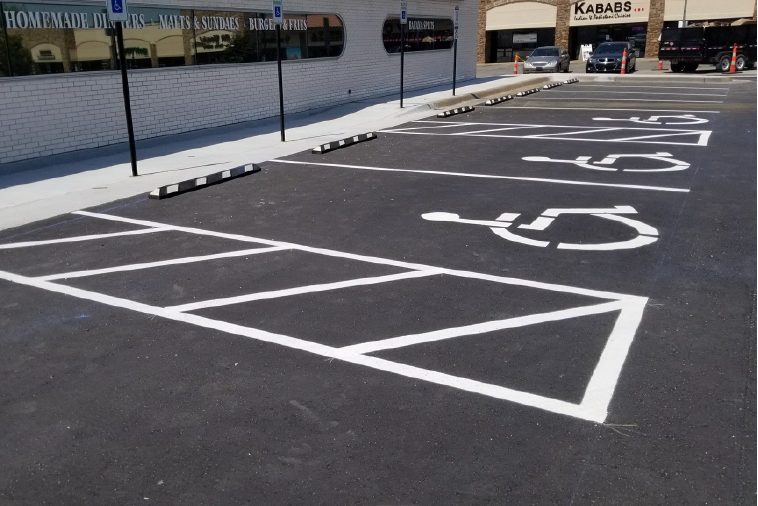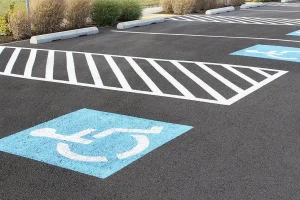The Americans with Disabilities Act was signed into law in 1990 by the United States Department of Justice, prohibiting discrimination against individuals based on disability. This civil rights law not only affects employers and their ability to provide reasonable accommodations to disabled workers but also imposes accessibility requirements on public accommodations and commercial facilities, encompassing everything from restaurants and retail stores to office buildings and warehouses.
Whether you are a building owner, landlord, or facility manager, it is essential to the success of your business that you consult with an experienced concrete company to ensure your parking lot, sidewalks, ramps, striping, and signage are in compliance with specific ADA regulations and pass proper inspections. Not only could a non-compliant parking lot lead to complaints and fines, but it could ultimately lead to a lawsuit! Our experts at Encore Pavement, a trusted asphalt paving and concrete company in Wichita, Kansas, have detailed the importance of ADA compliance and how to safely accommodate individuals with disabilities. Learn more about navigating ADA compliance requirements below!
What Is ADA Compliance?
Although the Americans with Disabilities Act was passed over 25 years ago and requires employers to provide reasonable accommodations for individuals with disabilities, many businesses still experience confusion when navigating the federal and state-specific mandates. Oftentimes business owners and property managers mistake a “code-compliant” building, meaning that a parking lot is compliant with the specific building codes, as an “ADA-compliant” building, meaning all ADA requirements have been implemented. Additionally, due to each state and municipalities’ right to set their own standards for ADA compliance separate from federal requirements, a parking lot that is compliant with the 2010 ADA Standards for Accessible Design could potentially still be out of local compliance, subjecting business owners to fines, complaints, and even lawsuits. Because of the varying regulations for accessible parking lots, compliant parking in Kansas may look completely different from compliant parking in California or New York, so it is increasingly important to partner with an expert asphalt paving and concrete company to navigate specific local and state ADA requirements. Not only will you be able to rest easy knowing that your parking lot is in compliance with all state and local guidelines, but you will be able to focus your time on running a successful business!
Understanding ADA Regulations
The most updated parking lot standards outlined in the 2010 ADA Standards for Accessible Design ensure the uniform compliance of all accessibility regulations and showcases all physical construction and alterations subject to these requirements. When performing regular parking lot maintenance or reconstructing an entirely new parking lot, it is crucial to understand the comprehensive list of accessibility requirements specified by the Department of Justice. Some of the most notable federal standards to consider when undergoing parking lot construction include the following:
- Accessible parking should be located in an area that ensures the easiest and quickest travel route to the building entrance. This does not require the accessible parking spaces to be located closest to the building but requires that they be placed in a location that offers the most direct access.
- For smaller parking lots containing fewer than 25 parking spaces, one parking space must be accessible. These values will vary based on parking lot size, with every additional 25 spaces that a parking lot has requiring one additional accessible parking space. For larger parking lots containing more than 1,000 spaces, the number of accessible spaces is determined on a lot-by-lot basis, fluctuating based on the facility type (hospitals and rehabilitation centers typically require higher volumes of accessible parking spaces).
- Parking surfaces dedicated to accessible spaces and aisles must be stable and slip-resistance, without any surface inconsistencies or leveling issues. An incline slope of up to 1.48 inches is acceptable, but the ADA suggests that each property manager check the slope of multiple spaces to ensure that all requirements are met.
- Specific states and municipalities may provide additional requirements outlining which color of paint to use. Accessible parking spots are required to have widths of eight feet, with no-parking zones in between stalls measuring five feet wide.
- Each accessible parking space must be marked with appropriate signage, including the International Symbol of Accessibility (ISA). The sign should be five feet above the surface of the marked space, including the curb height.
Partnering With an Experienced Concrete Company
Regardless of your local and state-specific regulations, it is essential for the success of your business to partner with an experienced asphalt paving and concrete company in Wichita to ensure that your parking lot is safe and accessible for all individuals. When consulting with a concrete company experienced in ADA compliance, your contractor will be well versed in federal and state compliances and can design a practical parking lot specific to your needs. Not only will they perform proper striping for all accessible parking spaces, but they will first reference all available blueprints and note which areas need improvement to begin working on a parking configuration or reconfiguration. Depending on the condition of your parking lot, additional construction may be required to correct improper curb ramps or issues of excessive slope. At Encore Pavement, our team of experts will guarantee that your parking lot complies with all ADA regulations while providing you with a feasible long-term option.



